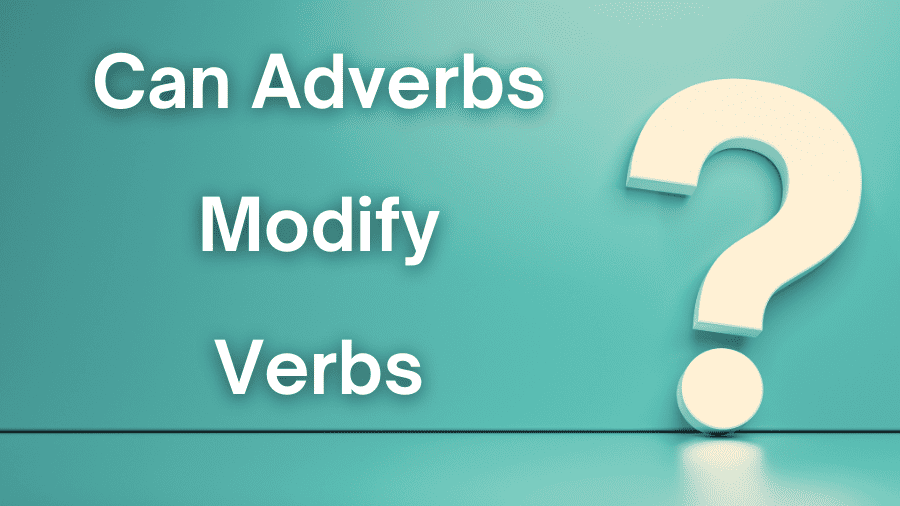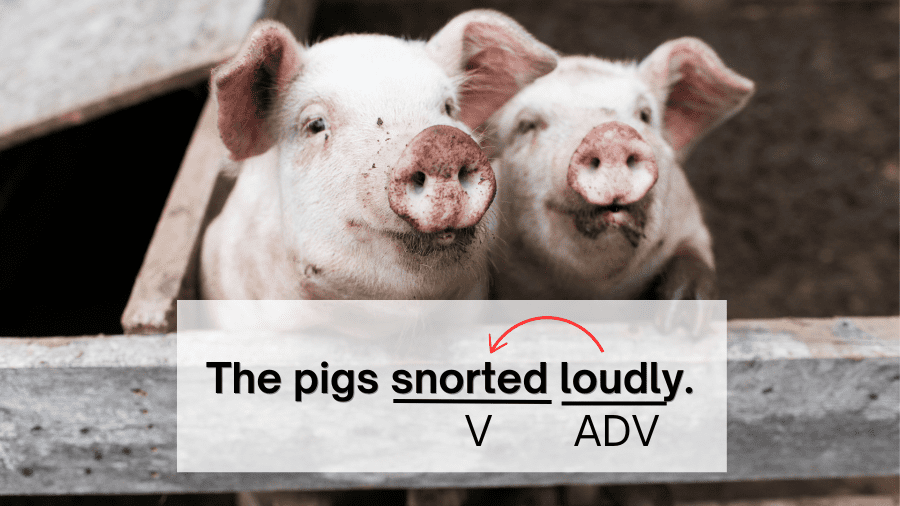This article may contain affiliate links. Please see our affiliate disclaimer in the footer menu for more information. Thank you for your support!

Adverbs are versatile since they can modify (i.e., describe) several parts of speech. But can adverbs modify verbs?
Adverbs can modify verbs. In doing so, they typically answer the questions how, when, where, or to what extent (how often or how much) about the action being performed. Adverbs can come before or after the verb they modify.
Let’s ensure we have a solid understanding of adverbs and verbs by briefly reviewing these parts of speech. Then we’ll see several examples of adverbs modifying verbs. Finally, you can try your hand at the quiz at the end of this post.
Let’s get started! 😊
What Are Adverbs?
Adverbs are one of the eight parts of speech in the English language.
Here are the parts of speech:
- nouns
- pronouns
- verbs
- adjectives
- adverbs
- prepositions
- conjunctions
- interjections
Let’s see a solid definition of the word adverb:
“Adverbs are words that usually modify—that is, they limit or restrict the meaning of—verbs. They may also modify adjectives, other adverbs, phrases, or even entire sentences.”
– Merriam-Webster.com Dictionary
So we know that adverbs modify (describe) verbs—that’s their primary gig! However, they also modify adjectives and other adverbs.
Adverbs usually answer one of the following questions when they modify one of these three parts of speech:
- How?
- When?
- Where?
- To what extent? (How often? or How much?)
We usually form adverbs by adding ly to the end of an adjective.
But it’s important to remember that not all adverbs end in ly.
Now let’s get clear on verbs.
What Are Verbs?
Verbs are best known as action words.
Let’s check out a sound definition of the word verb:
“Verbs are words that show an action (sing), occurrence (develop), or state of being (exist). Almost every sentence requires a verb. The basic form of a verb is known as its infinitive. The forms call, love, break, and go are all infinitives.”
– Merriam-Webster.com Dictionary
We have many different kinds of verbs; however, when discussing how adverbs modify verbs, it’s important to distinguish between action and linking verbs.
Action Verbs vs. Linking Verbs
You probably have a good idea of what constitutes an action verb.
Here are examples of common action verbs:

- walk
- see
- laugh
- play
- eat
- write
- listen
- love
- think
- learn
Linking verbs merit more of an explanation.
As their name suggests, they link the subject of a sentence to a noun, pronoun, or adjective that describes the subject.
Instead of showing action, linking verbs demonstrate states of being.
Here are several examples of linking verbs:
- the “be” verbs (am, is, are, was, were, be, being, been)
- look
- sound
- taste
- smell
- feel
- appear
- seem
- become
Let’s see a simple sentence with a linking verb.
Example Sentence: She is happy.
Explanation: She is the subject, is is the linking verb, and happy is an adjective that describes the subject.
It helps to think of a linking verb as an equal sign. (She = happy.)
Why is it essential to distinguish between linking and action verbs?
It’s important because we use adjectives (not adverbs) with linking verbs.
Let’s see what it would look like to use an adverb instead of an adjective in that last sentence.
Incorrect: She is happily.
Explanation: This sentence contains one of the “be” verbs (is), which is a linking verb. Therefore, we need to use an adjective (happy), not an adverb (happily).
Correct: She is happy.
If you’d like to see more examples of how we use adjectives with linking verbs, I discuss that in my post about finding adverbs.
Now let’s see adverbs playing their most common role: modifying verbs.
You’ll notice how the examples below show adverbs modifying action verbs.
Adverbs Can Modify Verbs
We know definitively that adverbs modify verbs, so let’s see how this happens.
As mentioned, adverbs tell us how, when, where, and to what extent (how often or how much) about the action being performed.
Examples of Adverbs Modifying Verbs

1) Example: The pigs snorted loudly.
The verb in this sentence is snorted.
The adverb loudly tells us how the pigs snorted.
- How did the pigs snort? (loudly)
2) Example: Paul will play soccer soon.
The verb in this sentence is play.
The adverb soon tells us when Paul will play soccer.
- When will Paul play soccer? (soon)
3) Example: She found the bird’s nest here.
The verb in this sentence is found.
The adverb here lets us know where she found the nest.
- Where did she find the nest? (here)
4) Example: Mel occasionally hikes the four-mile loop.
The verb in this sentence is hikes.
The adverb occasionally tells us to what extent (how often) Mel hikes the four-mile loop.
- How often does Mel hike that loop? (occasionally)
Before the quiz, let’s check out a couple of commonly asked questions.
Frequently Asked Questions
What can adverbs not modify?
Concerning parts of speech, adverbs can’t modify (describe) nouns, pronouns, or interjections. However, they can modify verbs, adjectives, and other adverbs. Occasionally, they can even modify prepositions and conjunctions. Lastly, adverbs can modify a word, a phrase, or a whole sentence.
Do adverbs modify nouns and verbs?
Adverbs do not modify nouns (or pronouns). However, they do modify verbs. Additionally, adverbs can modify adjectives and other adverbs. When they modify one of these three parts of speech, they answer the questions how, when, where, and to what extent (how often or how much).
Quiz: Adverbs Modifying Verbs
Now for the quiz! 😊
If you get a question wrong, I’ll show you the right answer and explain it.
And if you’d like to learn more about adverbs, Om Proofreading has an article showing how adverbs modify adjectives. It comes with a quiz too.
Important: After finishing the quiz, please scroll back up the page and click the “View score” button.
I hope this post has answered your question about whether adverbs can modify verbs.
Best wishes to you!
“Judging is preventing us from understanding a new truth. Free yourself from the rules of old judgments and create the space for new understanding.”
– Steve Maraboli

Recent Posts
Punctuation is important because it enables us to communicate our message clearly and effectively. Without punctuation, we wouldn’t understand how units of a sentence relate to one another or how...
Although you're probably somewhat familiar with adverbs, you may be unaware of sentence adverbs. As a trained proofreader who has studied the parts of speech, I can help you understand this unique...
